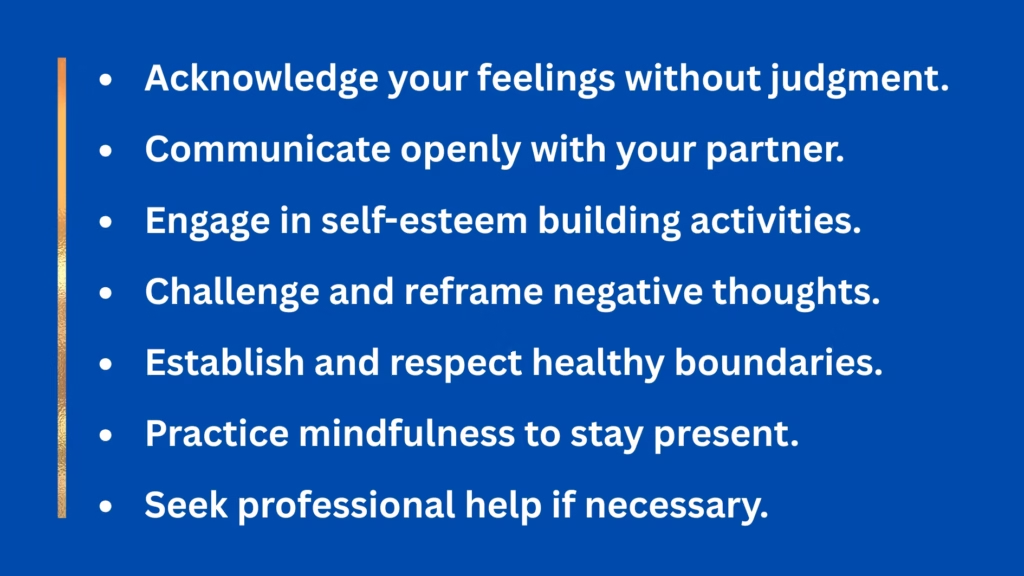How to stop being jealous—Many of us struggle with this dilemma in the back of our minds. Even the most loving marriages can be subtly undermined by jealousy, that nagging sense of unease. The good news is that envy can be turned into a motivator for greater trust and connection if you put in the necessary work and have the appropriate resources.

Understanding the Roots of Jealousy
A combination of prior traumas, personal anxieties, and loss anxiety frequently lead to jealousy. It’s critical to understand that these emotions are normal but must be handled in a healthy way.
Step 1: Acknowledge and Accept Your Feelings
Recognizing jealousy’s existence without passing judgment is the first step towards conquering it. Recognize that jealousy is an indication that something within of you needs care, not a proof that you’re a horrible relationship.
Real-life example: Sarah noticed she felt uneasy whenever her partner mentioned a female colleague. Instead of suppressing her feelings, she acknowledged them and explored their origins, realizing they stemmed from past betrayals.
Step 2: Communicate Openly with Your Partner
The foundation of trust is open and sincere communication. Talk to your partner about how you feel without placing blame or making accusations. Make use of “I” expressions to convey your feelings about particular circumstances.
Example: “I feel insecure when I see you spending time with your ex because I fear losing our connection.”
Step 3: Build Self-Esteem and Self-Worth
Low self-esteem is frequently the root cause of jealousy. Take part in activities that give you a sense of fulfillment and confidence. Honor your accomplishments and remind yourself of your special traits.
Tips:
-
Pursue hobbies and interests that bring you joy.
-
Practice positive affirmations daily.
-
Surround yourself with supportive and uplifting people.
Step 4: Challenge Negative Thoughts
Recognize and combat the illogical ideas that feed jealousy. Consider whether your anxieties are based on assumptions or if there is hard evidence to back them up.
Technique: Cognitive restructuring involves recognizing distorted thinking patterns and replacing them with more balanced perspectives.
Step 5: Set Healthy Boundaries
Clearly defining limits promotes security for both spouses. Talk about and decide on appropriate social interactions and behaviors.
Example: Agreeing that both partners will inform each other about one-on-one meetings with ex-partners to maintain transparency.
Step 6: Focus on the Present
Don’t obsess about imaginary situations or previous relationships. To remain rooted in the here and now and value your current relationship, engage in mindfulness exercises.
Mindfulness practices:
-
Meditation
-
Deep breathing exercises
-
Gratitude journaling
Step 7: Seek Professional Support if Needed
You should think about getting treatment from a therapist or counselor if jealously becomes too much to handle or causes harmful behaviors. Expert advice can give you the skills you need to effectively control your emotions.
Comparison Table: Healthy vs. Unhealthy Jealousy
| Aspect | Healthy Jealousy | Unhealthy Jealousy |
|---|---|---|
| Frequency | Occasional and manageable | Frequent and overwhelming |
| Communication | Open and constructive | Accusatory and confrontational |
| Trust Level | Maintained and reinforced | Eroded and diminished |
| Impact on Relationship | Strengthens bond through understanding | Creates distance and conflict |
| Emotional Response | Leads to self-reflection | Results in anger, resentment, or control issues |
Checklist: Managing Jealousy in Relationships
Expert Insight
Dr. Katie Schubert, a sex and couples therapist, emphasizes that “Jealousy is a complicated emotion that can be healthy and normal up until a point. When jealousy becomes an overly dominant emotion in your relationship it can cause serious problems and even lead to the end of your relationship if you don’t address these emotions within yourself.”
Final Thoughts
Overcoming jealousy is a journey of self-discovery and growth. You may turn jealousy into a chance for a closer bond and greater trust in your relationship by owning up to your feelings, being honest with others, and developing your sense of value. Recall that asking for assistance is a show of strength rather than weakness.
Special Advice
Accept your vulnerability as an asset. You can build connection and understanding with your lover by sharing your insecurities. Mutual respect and regular, truthful communication are the foundations of trust.
Call to Action
Are you prepared to change your relationship? Take action now by putting these steps into practice. Let’s encourage one another on this path to more wholesome, trustworthy relationships by exchanging stories and perspectives in the comments section below.
FAQs : How To Stop Being Jealous
Q1.What is the difference between jealousy and envy?
Jealousy involves fear of losing something you have, while envy is wanting something someone else possesses.
Q2.Is it normal to feel jealous in a relationship?
Yes, occasional jealousy is normal, but it’s important to address it constructively to prevent harm to the relationship.
Q3.Can jealousy be a sign of love?
While jealousy can stem from care, excessive jealousy often indicates insecurity rather than love.cupla.app+10teenvogue.com+10tonyrobbins.com+10
Q4.How can I communicate my jealousy without causing conflict?
Use “I” statements to express your feelings and focus on how situations affect you, avoiding blame.
Q5.What role does self-esteem play in jealousy?
Low self-esteem can contribute to feelings of jealousy; building self-worth can help mitigate these feelings.
Q6.When should I seek professional help for jealousy?
If jealousy leads to controlling behaviors, constant conflict, or emotional distress, consider seeking therapy.
Q7.How can mindfulness help with jealousy?
Mindfulness practices can help you stay present, reducing anxiety about imagined scenarios and past experiences.
Q8.What are healthy boundaries in a relationship?
Healthy boundaries involve mutual agreements on acceptable behaviors, fostering trust and respect.
Q9.Can jealousy ever be beneficial in a relationship?
Mild jealousy can prompt partners to appreciate each other more, but it must be managed healthily.
Q10.How do past experiences influence current jealousy?
Past betrayals or traumas can trigger jealousy in current relationships; recognizing this can aid in healing.
Useful Articles :-
- Signs of Love Bombing: 7 Red Flags to Spot Manipulative Affection Early
- What Is a Situationship? 7 Unfiltered Truths About Modern Love
- 10 Signs of a Healthy Relationship: What To Look For
- Communication Skills for Couples: 7 Transformative Tips to Strengthen Your Connection
- 7 Powerful Ways to Build Healthy Relationship Boundaries for Lasting Love
- 9 Empowering Steps for Recovering from a Breakup: Heal, Grow, and Thrive
- 7 Powerful Long-Distance Relationship Advice : Tips to Keep the Spark Alive
- Jealousy in Relationships: 7 Powerful Ways to Manage the Green-Eyed Monster
- 5 Insights Into Love Languages in Relationships : Do They Really Work?
- What Does Emotional Safety In Relationships? 7 Biblical Keys to Building Trust and Intimacy
